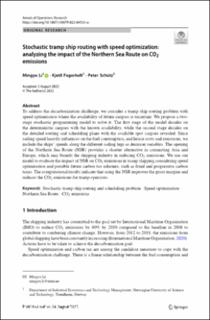Stochastic tramp ship routing with speed optimization: Analyzing the impact of the Northern Sea Route on CO2 emissions
Peer reviewed, Journal article
Published version

Permanent lenke
https://hdl.handle.net/11250/3043373Utgivelsesdato
2022Metadata
Vis full innførselSamlinger
Sammendrag
To address the decarbonization challenge, we consider a tramp ship routing problem with speed optimization where the availability of future cargoes is uncertain. We propose a two-stage stochastic programming model to solve it. The first stage of the model decides on the deterministic cargoes with the known availability, while the second stage decides on the detailed routing and scheduling plans with the available spot cargoes revealed. Since sailing speed heavily influences on the fuel consumption, and hence costs and emissions, we include the ships’ speeds along the different sailing legs as decision variables. The opening of the Northern Sea Route (NSR) provides a shorter alternative in connecting Asia and Europe, which may benefit the shipping industry in reducing CO2 emissions. We use our model to evaluate the impact of NSR on CO2 emissions in tramp shipping considering speed optimization and possible future carbon tax schemes, such as fixed and progressive carbon taxes. The computational results indicate that using the NSR improves the gross margins and reduces the CO2 emissions for tramp operators.
